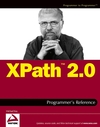|
Home > Learn XML > XML Books > XPath 2.0 Programmers Reference
XPath 2.0 Programmers Reference
XPath 2.0 Programmers Reference covers the following topics:
From its origins as a sublanguage of XSLT, XPath has come into its own as a key element of XML. XPath 2.0 has emerged as a robust language twice the size of its predecessor, complex and capable of standing on its own. This substantive volume, by the editor of the W3C® XSLT 2.0 specification, is the authoritative reference on XPath 2.0. It begins by thoroughly explaining the foundations, including XML schema and the evaluation context. Building on this knowledge, it then moves through literals and function calls, basic operators, path expressions, types, and the regular expressions of three new functions that greatly boost the power of XPath 2.0. Table of contents
Author BiographyDr. Michael Kay is the author of "XSLT Programmer's Reference" from Wrox Press, the standard reference work on XSLT. He is also the editor of the W3C's XSLT 2.0 specification, which is currently a Last Call Working Draft, and his Java-based Saxon XSLT processor is one of the most successful and popular XSLT processors in the language's history. The branch of Saxon supporting XSLT 1.0 is currently at release 6.5.3, and regular readers of this column will know that the 7.x branch of Saxon has been implementing more and more support for XSLT 2.0, and has also added support for XQuery. Michael recently formed his own company, Saxonica, and has launched a commercial version of Saxon with support for XML Schema Aware XSLT and XQuery processing. Additional Book Information
|
PURCHASE STYLUS STUDIO ONLINE TODAY!!Purchasing Stylus Studio from our online shop is Easy, Secure and Value Priced! Learn Stylus Studio in 6 MinutesCan six minutes change your life? A new action-packed online video demonstration covers how to use Stylus Studio in just six minutes! Watch this video and change the way you develop XML applications forever! Why Pay More for XML Tools?With Stylus Studio® X16 XML Enterprise Suite, you get the most comprehensive XML tool suite at one incredibly low price. Value: it's just one of many reasons why smart XML developers are choosing Stylus Studio! |
XML PRODUCTIVITY THROUGH INNOVATION ™

 Cart
Cart



